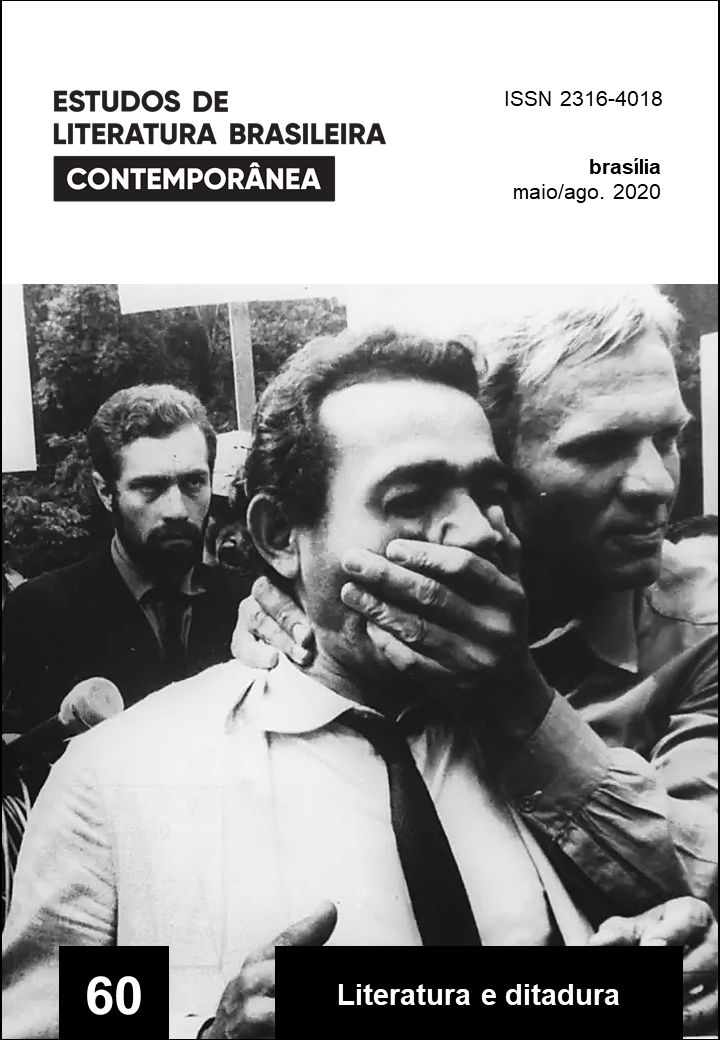Mea Culpa and Self-Punishment: The Collaborationist in Beatriz Bracher’s Não falei and the defector in Adriana Lisboa’s Azul-corvo
DOI:
https://doi.org/10.1590/2316-4018608Keywords:
military dictatorship, duty of memory, Araguaia guerrilla, tortureAbstract
This comparative study of the works Não falei (2004) by Beatriz Bracher and Azul-corvo (2012) by Adriana Lisboa aims to analyze the representations of the responsibility-transfer mechanisms from the State to ordinary citizens, for crimes against humanity committed during the period of military dictatorship in Brazil. Building on the thoughts of Žižek (2012), we will take a look at how individuals, through the roles of informant and defector, are liable for acts of “subjective violence” committed by the regime, disregarding a primordial “systemic violence.” Taken from a logical causal context, these acts are matched and judged outside the legal system, analyzed within the personal spheres, according to affective and moral judgements. In the light of Ricœur’s (2000) reflections on the abuses of oblivion, we will see how the “Amnesty Law” solidifies this alienating process that, in the interests of creating a national “imaginary unit,” dilutes all political crimes in a uniform amalgam of forgiveness. The Pollack’s (1993) concept of “underground memory” will help us observe the existing abuse also within the wheelhouse of memory, by forcing the penetration of the collective into the casing of individual memories. Finally, we will show how the imaginary, point of contact between literature and history, according to White (1987), proves to be an essential resource for freely remembering or forgetting, harboring these “subterranean memories.”
Downloads
References
AGÊNCIA Estado (2009). Araguaia era vigiado desde anos 60, diz ex-informante. O Estado de S. Paulo, 25 jun. Disponível em: https://bit.ly/3d5Du3I. Acesso em: 19 jun. 2019.
BARTHES, Roland (1972). Le degré zéro de l’écriture. Paris: Éditions du Seuil.
BRACHER, Beatriz (2004). Não falei. São Paulo: Editora 34.
BUTLER, Judith (2005). Trouble dans le genre. Le féminisme et la subversion de l’identité. Paris: Éditions La Découverte.
CARDIA, Mirian Lopes (2017). Operação Bandeirantes (Oban). Arquivo Nacional do Ministério da Justiça e Segurança Pública. Disponível em https://bit.ly/3aZdIfk. Acesso em: 23 jun. 2019.
COMISSÃO NACIONAL DA VERDADE (2014). Contexto histórico das graves violações entre 1946 e 1988. Relatório da Comissão Nacional da Verdade, v. 1, p. 85-110, dez. Disponível em: https://bit.ly/2Wix2Aa. Acesso em: 19 jun. 2019.
DENIS, Benoît (2000). Littérature et engagement. De Pascal à Sartre. Paris: Éditions du Seuil.
FERREIRA, Aurélio Buarque de Holanda (1986). Dicionário Aurélio. Rio de Janeiro: Nova Fronteira.
FREUD, Sigmund (1985). L’inquiétante étrangeté et autres essais. Paris: Éditions Gallimard.
GIRARD, René (1998). La violence et le sacré. Paris: Hachette Pluriel.
GODOY, Marcelo (2014). Uma biografia do DOI-Codi (1969-1991), o centro de sequestro, tortura e morte da ditadura militar. São Paulo: Alameda Editorial.
HOUAISS, Antônio (2001). Dicionário Houaiss da língua portuguesa. Rio de Janeiro: Objetiva.
LISBOA, Adriana (2012). Azul-corvo. Lisboa: Quetzal.
MORAIS, Taís; SILVA, Eumano (2005). Operação Araguaia. São Paulo: Geração Editorial.
POLLAK, Michael (1990). L’expérience concentrationnaire. Paris: Éditions Métaillié.
POLLAK, Michael (1993). Une identité blessée. Paris: Éditions Métaillié.
RICŒUR, Paul (2000). La mémoire, l’histoire et l’oubli. Paris: Seuil.
TERNUMA (2011). Quem somos: grupo terrorismo nunca mais. Disponível em: https://www.ternuma.com.br/index.php/quem-somos. Acesso em: 19 jun. 2019.
WHITE, Hayden (1987). The content of the form. Narrative discourse and historical representation. Baltimore: The Johns Hopkins University Press.
ŽIŽEK, Slavoj (2012). Violence: la violence n’est pas un accident de nos systèmes, elle en est la cause. Paris: Au Diable Vauvert.
Downloads
Published
How to Cite
Issue
Section
License
Authors who publish in this journal agree to the following terms:
a) The authors maintain the copyright and grant the journal the right of first publication, the work being simultaneously licensed under the Creative Commons Attribution License-Non Commercial 4.0 which allows the sharing of the work with acknowledgment of the authorship of the work and publication this journal.
b) Authors are authorized to enter into additional contracts separately, for non-exclusive distribution of the version of the work published in this journal (eg publish in institutional repository or as a book chapter), with authorship recognition and publication in this journal.
c) Authors are allowed and encouraged to publish and distribute their work online (eg in institutional repositories or on their personal page) after the editorial process, as this can generate productive changes, as well as increase the impact and citation of published work (See The Effect of Free Access).
d) The authors of the approved works authorize the magazine to, after publication, transfer its content for reproduction in content crawlers, virtual libraries and the like.
e) The authors assume that the texts submitted to the publication are of their original creation, being fully responsible for their content in the event of possible opposition by third parties.


